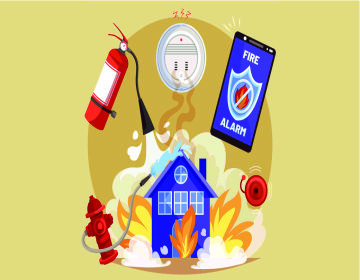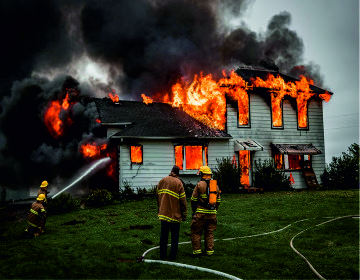


Safe Haven - Fire Safety at Home
Safe Haven - Fire Safety at Home
By: Rakesh Parashar, Safety Consultant
Fire is one of humanity's oldest and most significant discoveries, shaping the course of human evolution and civilization. Natural occurrences such as lightning strikes likely ignited the first fires, which primitive humans observed, and later learned to use. Archaeological evidence suggests that our ancestors used fire as far back as 1.5 million years ago, primarily for light, warmth, and protection from predators and pests.
The controlled use of fire marked a significant turning point in human evolution. Mastery over fire allowed early humans to cook food, making it tastier and more digestible. This dietary shift contributed to brain development and the evolution of Homo sapiens, which lead to fire becoming an indispensable tool for mankind. Today, it is impossible to imagine life without fire.
However, despite its many benefits, fire-related accidents result in significant loss of life and economic impact each year globally. According to the World Health Organization, it is estimated that approximately 1,80,000 people die worldwide every year from fire-related accidents. This includes both industrial and domestic settings, with domestic fires contributing a substantial portion of these fatalities. The economic impact of fire-related accidents is estimated to be around $300 billion globally, each year, which represents a significant burden on the global GDP.
The phrase 'Fire is a good servant, but a bad master' thus aptly captures the dual nature of fire, as it serves as an invaluable tool when managed properly, yet can become overwhelmingly destructive when left unchecked. This highlights the essential balance between harnessing fire’s benefits and mitigating its potential hazards, underscoring the critical need for enhanced fire safety measures, prevention strategies, and effective emergency response systems, to reduce both the human and economic toll of fires worldwide.
While extensive literature exists on fire safety in industrial settings, there is a notable lack of resources dedicated to protecting ourselves and our homes from fire hazards. This article focuses on fire safety in the Indian domestic context, offering practical advice to help protect our homes and our loved ones from the dangers of fire.
Why fire safety matters at home
Domestic fires can start suddenly and spread rapidly, causing severe damage and posing a threat to lives and property. According to data from the National Crime Records Bureau (NCRB), thousands of incidents of domestic fires are reported every year in India, which account for around 2,500 fatalities on an average each year.
Since homes are generally, not as prepared to fight fires as businesses and industrial units, they have far reaching financial and emotional impact on individuals. Thus, adopting fire safety measures at home is not just a necessity, but a vital responsibility, to ensure the safety of our loved ones and the protection of our property.
Most domestic fires are preventable. Understanding the common causes of domestic fires can help us to significantly reduce the risk.
Common causes of home fires
Some typical scenarios where home fires may start include:
- Cooking: The kitchen is one of the most common places for fires to start in the homes. Leaving cooking unattended, overheating oil, or placing flammable items like cloth towels or paper near the stove can lead to fires.
- Electricity: Faulty, or outdated wiring, overloaded power sockets, and the misuse of electrical appliances can also cause fires. Appliances that are old or not functioning properly can also be a risk.
- Open flames: Candles or oil lamps left burning without supervision, can easily start a fire. Placing them near flammable materials or leaving them burning while asleep can be hazardous.
- Flammable liquids: Storing petrol, kerosene, or other flammable liquids in the house, especially near sources of heat, can also lead to accidental fires.
- Smoking: Cigarettes and other smoking materials are dangerous if not completely extinguished. Falling asleep while smoking or leaving lit cigarettes unattended can also start fires.
Practical fire safety tips for homes
Taking proactive steps to ensure fire safety can significantly reduce the risk of fires and improve the overall safety of our homes. Here are some simple, everyday tips to help prevent fires in our homes, particularly focusing on kitchen and electrical safety.
Basic kitchen safety
The kitchen is not only the heart of the home, but also one of the most common places for fires to start. Some basic fire safety measures to keep your kitchen safe include:
- Stay attentive while cooking: Always keep an eye on the stove when cooking, especially when frying. Never leave a pan of hot oil unattended, as it can quickly overheat and catch fire. If you must leave, even for a short period, turn off the stove.
- Practice safe cooking methods: Avoid wearing loose clothing and keeping long hair open while cooking, as they can easily catch fire. Use cloth napkins, pot-holders or gloves to handle hot utensils and always have a lid or towel available nearby to smother small fires in an emergency.
- Keep flammable items away: Store flammable items like dish clothes, paper towels, or packaging materials away from the stove. These can easily catch fire if they come into contact with heat or open flames.
- Keep appliances clean: Regularly clean cooking appliances, including ovens, stovetops, and microwaves, to prevent grease and food buildup, which can ignite.
- Use cooking oil carefully: If you are frying, never fill the pan more than one-third full of oil, and heat oil slowly to the desired temperature. If oil starts to smoke, turn off the heat immediately or else it can even catch fire.
- Keep children and pets away from the cooking area: Do not let children or your pets to come within three feet around the stove and hot appliances.
Basic electrical safety
Electrical safety is crucial to prevent fires and ensure the safety of your home. Some basic fire safety measures for electrical safety at home include:
- Avoid overloading electrical outlets: Using too many devices from a single socket or extension boards can cause overheating and lead to fires. If you have to use extension cords, use them only as a temporary solution. Ensure that you use proper extension boards with surge protectors and never plug one extension board into another. Plug heavy-duty appliances like refrigerators, washing machines, air conditioners and heaters directly into wall outlets, and never on extension boards, as they can overheat and start a fire.
- Inspect electrical cords: Check the cords of your appliances regularly. If you notice frayed wires, cracks, or other damage, replace the cord immediately. Using damaged cords increases the risk of short circuits and fires.
- Maintain electrical equipment: Regularly inspect and service electrical appliances, such as induction cooktops, chimneys, ovens, toasters, mixers, room heaters, geysers etc. and ensure they are always used according to the manufacturer’s instructions. Ensure that cooking chimneys are cleaned regularly as over time, grease, oil, and other residues from cooking can accumulate in the chimney, which can significantly increase the risk of a grease fire.
- Keep an eye on heating equipment: Use your heating equipment like room heaters, with care, and do not place them too close to flammable materials like curtains, bedding, furniture etc. or use them without proper ventilation. Make sure to turn them off when you leave the room or go to bed. Having them inspected annually by a professional is a good idea.
- Turn off appliances when not in use: Unplugging appliances when they are not in use is a simple way to prevent fires. This is especially important for appliances that generate heat, such as irons, heaters, geysers or electric kettles.
- Install proper fuses: Make sure that the electrical system of your home’s is equipped with the correct fuses or circuit breakers, as using the wrong fuse can cause overheating and fires.
Simple fire safety tips for every home
Apart from these simple kitchen and electrical safety measures, here are some other practical tips that everyone can follow at home:
- Install smoke detectors: Smoke detectors are the first line of defence in detecting fires. While they are not yet widely adopted in Indian homes, installing them is highly recommended.
- Open flames: In India, candles and oil lamps are commonly used for prayers, or during power cuts. To ensure safety, always place them in sturdy holders on stable surfaces, away from flammable materials such as curtains, paper, and clothing. Avoid placing them directly on wooden surfaces. Never leave candles or oil lamps unattended, and make sure to extinguish them before leaving the room or going to bed.
- Flammable liquids: Minimise the storage of flammable materials such as petrol, kerosene, and paints in the house. If necessary, ensure they are kept in properly sealed containers which are tightly closed, and stored in cool, well-ventilated areas away from heat sources and out of reach of children.
- Smoking: If you smoke, do so outside and well away from flammable materials. Always use deep, sturdy ashtrays to prevent cigarettes from falling out and ensure that cigarette butts and matches are fully extinguished before disposal. Additionally, never smoke in bed or when drowsy to minimise fire risks.
- Keep fire extinguishers handy: Although having fire extinguishers is not very common in Indian homes, it is highly advisable to have them. Place extinguishers in easily accessible locations, such as the kitchen and near potential fire hazards. Make sure you and everyone in your household are trained in their proper use. Additionally, regularly inspect the extinguishers to ensure they are charged and ready for use.
- Secure matches and lighters: Store matches and lighters out of reach of children and in a safe and secure place.
What to do in the event of a fire
Despite the best preventive measures fires can still occur at home. Knowing how to prevent and respond to fires quickly and effectively can be crucial for saving lives and protecting property.
Some steps which can help minimise damage and ensure everyone’s safety include:
- Stay calm and act quickly: Remaining calm during a fire is essential for clear thinking and effective decision-making, which can greatly enhance your safety and chances of survival.
- Fighting small fires: For small fires involving flammable materials like wood, cloth, or paper, water, is the best solution. You can use a water-based extinguisher if available at home. Alternatively, you can smother the fire with a heavy, non-flammable blanket.
- Cooking fire: Grease fires are common in kitchens and can be very dangerous. In the event of a grease fire, cover the flames with a lid or a damp towel. Do not use water to put out a grease fire under any circumstances, as it can cause violent flare-ups and spread the fire further.
- Electrical fires: In the event of an electrical fire, immediately unplug the device and turn off the power, if it is safe to do so. Use a fire blanket or a Class C fire extinguisher, such as CO2 or Dry Chemical Powder extinguishers, to extinguish the fire. Never use water or water-based extinguishers on electrical fires, as water can conduct electricity and cause electrocution.
- Sound the alarm: Alert everyone in the home to the fire. Use a loud voice or an alarm to ensure everyone is aware.
- Evacuate if necessary: If the fire becomes too large or uncontrollable, do not try to be a hero and fight the fire. Instead, prioritise safety by evacuating the house immediately alongwith all family members. Close doors behind you to help slow the spread of fire.
- Call for help: Once safely outside, contact the fire department or emergency services. Provide them with your exact location and complete details about the fire.
- Do not re-enter: Never go back inside a burning building. Wait for the fire department to declare the area safe before re-entering.
Conclusion
Safeguarding our homes against fire hazards transcends mere precaution; it is an essential commitment to the safety of our loved ones and the protection of our valuable property. In the Indian context, where diverse living conditions and varying levels of infrastructure present unique challenges, effective fire safety measures are even more crucial. By adopting practical steps, whether it is staying alert while cooking, being cautious with electrical appliances, or knowing how to respond if a fire starts, we can significantly reduce the risk of devastating fires.
As we strive to create safer living environments, let us remember that vigilance and preparedness are our best defenses. Equipping ourselves with knowledge and pro-active safety practices will not only safeguard our homes, and possessions, but most importantly, it will ensure the safety of our loved ones. A small investment in fire safety today can prevent profound losses tomorrow. Let’s ensure that fire remains a beneficial tool rather than a destructive force, reinforcing our commitment to a safer, more secure home for everyone.
Recent Articles
Combating Forest Fires: Strategies, Challenges, an...
Contributed by:
Mr Bharat Parekh
Vice President
Fire Safety Devices Pvt Ltd
Forest fires, also known as wildfires, are among the most destructive natu...
The Significance of Safety in the Workplace
The Significance of Safety in the Workplace
Contributed by
Mr Rahul Sakhuja
Director
Safety Experts
In today&rsq...
Guardians of Safety: The Vital Role of Flame Detec...
"Guardians of Safety: The Vital Role of Flame Detectors in Industrial Environments"
Contributed By:
Mr. Ashish Shah
CEO, Ambetronics Engineers Pvt. Ltd.
...Protective Footwear: A Crucial Element of Occupati...
Protective Footwear: A Crucial Element of Occupational Safety and Health
Contributed by:
Mr. H. S. Bahety
CEO, Unistar Footwear Pvt. Ltd.
In any w...
Ensuring Fire Safety: The Importance of Testing &a...
Ensuring Fire Safety: The Importance of Testing & Certificationas per Indian Standards
Author: Sandy Dweik, CEO of Thomas Bell-Wright
Fire safet...

